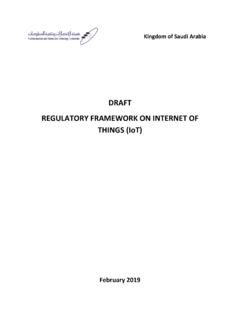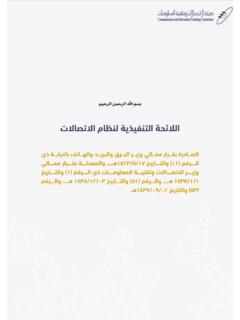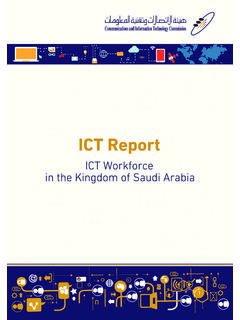Transcription of Telecom Act - CITC
1 1 Telecom Act Issued under the Council of Ministers resolution No. (74) dated 05/03/1422H (corresponding to 27/05/2001) Approved pursuant to the royal Decree No. (M/12) dated 12/03/1422H (corresponding to 03/06/2001) This English language text is not an official translation and is provided for information purposes only . It confers no rights and impose no obligation separate from those from those conferred or imposed by the original Arabic text formally adopted and published. In the event of any discrepancies between the English translation and the Arabic original, the Arabic original shall prevail. 2 Chapter 1 : Definitions Article One: For the purpose of application of this Act, the following expressions shall have the meaning hereunder assigned to them unless otherwise specified: Kingdom: The Kingdom of Saudi Arabia. The Act: The Telecommunications Act. The Bylaws: The By-Laws of the Act. The Ordinance: Ordinance of Saudi Communications Commission.
2 The Ministry: The Ministry of Post, Telegraph & Telephone. The Minister: The Minister of Post, Telegraph & Telephone. The Commission: Saudi Communications Commission. The Board: The Board of the Saudi Communications Commission. Telecommunications: The conveyance of signals between defined termination points by wire/ wireless equipment, including the conveyance of signals over the Internet. Telecommunications services: Conveying and routing of signals in whole or in part over the public telecommunications networks including Radio Transmission and Internet services. 3 Telecommunications network: The systems used for provision of telecommunication services, including switching equipment, cables, towers, wireless equipment, optical, electromagnetic or any other telecommunications means and the associated equipment Universal Service: Provision of the minimum level of telecommunications services with adequate quality and affordable prices to all users. Universal Access: Provision of opportunity to all users in the kingdom to utilize the minimum level of the adequate quality telecommunications services within specific geographical area and with affordable price.
3 The Operator Service provider : Any licensee providing public telecommunications service or operating telecommunications network used to provide such service. Dominant Operator: The operator whose service covers at least 40% of specific telecommunications market in the Kingdom, unless the Commission decides to change this share according to the market situation. The User: The natural person or corporate body who uses the telecommunications services. Frequency: Number of cycles per second of a radio wave. Frequency Spectrum: The frequency bands that can be used in Radio Communication as per International Radio Regulations. National Frequency Spectrum Plan: The plan prepared by the Commission and approved by the Council of Ministers for allocation of the frequency spectrum usage to the concerned parties. Numbering: It is a serial numbering pattern to identify designated termination point in the public telecommunications network, and includes the necessary information for routing of the telecommunication signals to this termination point.
4 National Numbering Plan: The plan prepared by the Commission to specify the scheme of numbers used in various telecommunications services. 4 Chapter 2 : General Provisions Article Two: The supervision of the Telecommunications Sector shall be as follows: 1. The Ministry shall make the general policies, plans and development programs for the telecommunications sector, submit applications for granting licenses as stipulated by this Act, its modifications and any amendments, coordinate with the concerned parties in respect of services provided to the government agencies, represent the Kingdom in domestic, regional and international bodies in the telecommunications sector and, at its discretion, delegate such representation to the Commission and other parties, approve the basis, principles and conditions relating to the Universal Service and the Universal Access as proposed by the Commission 2.
5 The Commission shall perform the functions and duties conferred upon it under this Act, the Bylaws and the Ordinance Article Three: The Telecommunications Sector shall be regulated under this Act and pursuant to the following objectives: 1. To provide advanced and adequate telecommunications services at affordable prices 2. To ensure the provision of access to the public telecommunications networks, equipment and services at affordable prices 3. To ensure creation of favorable atmosphere to promote and encourage fair competition in all fields of telecommunications 4. To ensure effective and interference-free usage of frequencies 5. To ensure effective usage of National Numbering Plan 6. To ensure clarity and transparency of procedures 7. To ensure principles of equality and non-discrimination 8. To safeguard the public interest and the user interest as well as maintain the confidentiality and security of telecommunications information 9.
6 To ensure transfer and migration of telecommunications technology to keep pace with its development Article Four: The fixed and mobile telecommunication services shall only be provided through joint-stock companies that place their stock for public subscription. Article Five: The license for provision of fixed and mobile telephone services is subject to the Council of Ministers' approval. Article Six: Necessary fees shall be paid in favor of the General Treasury for commercial provision of services, issuance of licenses to operators and permits for frequency usage as per the decree of Council of Ministers. 5 Article Seven: The Commission shall set the principles and criteria for determining the telecommunications services fees in keeping with the competitive situation and the Bylaws shall state the necessary and relevant provisions. Article Eight: The Universal Service and the Universal Access requirements shall apply according to the principles and criteria stipulated by the Bylaws.
7 Article Nine: The privacy and confidentiality of telephone calls and information transmitted or received through public telecommunications networks shall be maintained. Disclosing, listening or recording the same is not permitted, except for the cases stipulated by the relevant Acts. Article Ten: The Commission shall provide the necessary protection to the users and operators. The Bylaws shall specify the procedures for settlement of disputes arising among the operators themselves or between operators and users, including objection by users to billed amounts or the quality of the offered service. Chapter 3 : Frequencies Article Eleven: Frequency Spectrum is a state-owned natural resource. The Council of Ministers is the approving authority of the National Frequency Spectrum Plan for the purpose of achieving optimum utilization of this national resource, in accordance with International and Regional Agreements and approved regulations and standards.
8 Article Twelve: The Commission shall regulate the frequencies as follows: 1. The Commission shall set the National Frequency Spectrum Plan in coordination with the involved parties, refer the same to the Ministry, for submission to the Council of Ministers for approval 2.. The Commission shall ensure that the frequencies are used in conformity with the National Frequency Spectrum Plan. Further, it shall set a special register called "National Frequency Register" to record all the information pertaining to the frequencies, their allocation and usage 3. The concerned parties, as per their responsibilities, shall manage and supervise their assigned frequencies. The frequencies shall be used only for the purpose for which they are assigned 4. The Commission shall manage and supervise frequencies assigned for civil and commercial purposes. It shall set a plan for distribution and usage of these frequencies, and shall submit the same to the Minister for approval 6 Article Thirteen: Any frequency allocated for civil or commercial purposes shall not be used by any user or operator without prior assignment by the Commission, obtaining the necessary license and payment of fees for usage of this frequency pursuant to the procedures prescribed by the Bylaws.
9 Article Fourteen: In the event the frequencies are used in a manner contradicting this Act, its Bylaws or the licensing provisions, the Commission shall have the right to issue a decision to cease operation of the equipment used in violation or withdraw the same from service and resort to security authorities to enforce the decision if need be . Chapter 4 : Numbering Article Fifteen: The Commission shall set the National Numbering Plan, and shall be responsible for the plan structure and management in order to meet the operators and users requirements pursuant to the procedures stipulated by the Bylaws. Article Sixteen: The Commission shall determine the conditions, the usage licensing procedures and fees, which shall be applicable to the assignment of numbers. Article Seventeen: The Commission shall have the right to modify the numbering scheme in the National Numbering Plan, provided that operators and users are given adequate notice prior to the implementation date of such modification.
10 Chapter 5 : Licenses Article Eighteen: Anyone who fulfills the conditions and has the interest to provide Telecommunications service, should submit his application to the Commission in order to obtain the license. The Commission 7 shall issue the license according to the provisions of the Act and the Bylaws. The operators shall adhere to the conditions stated in the license issued to them. Article Nineteen: No license shall be required from the Commission for the establishment of a private internal telecommunication network with a limited capacity for the interconnection between the parts of a one facility like hospitals, residential compounds and hotels. This network shall not be interconnected with the public telecommunication networks unless an approval is obtained as per rules and procedures under the Bylaws Article Twenty: 1. Licenses shall be renewed by a decision of the Board. The relevant standards, rules and procedures shall be specified under the Bylaws 2.














